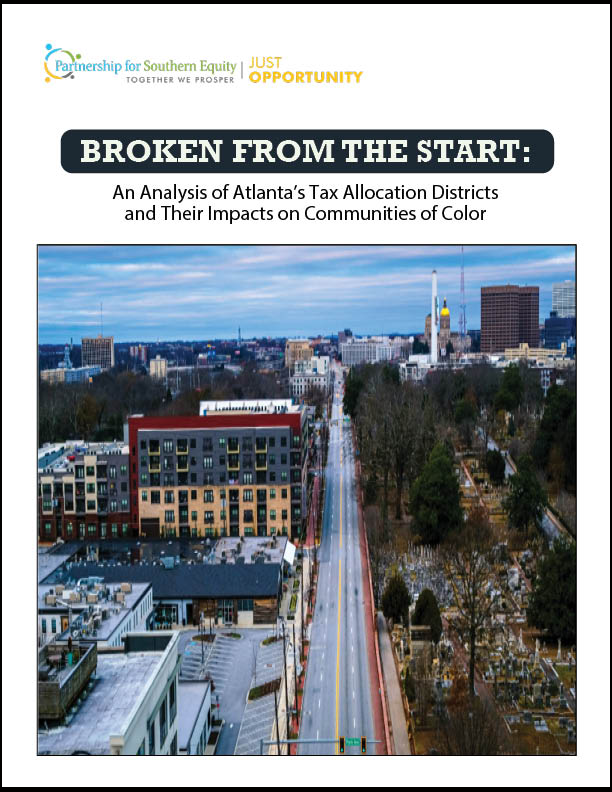DEED Report Released – Broken from the Start: An Analysis of Atlanta’s Tax Allocation Districts and Their Impacts on Communities of Color

ATLANTA – The Partnership for Southern Equity (PSE), seizing the present moment of opportunity for action and accountability to strengthen and engage communities, issued today a special report that explores whether property tax incentives in metropolitan Atlanta are effective in meeting their goal of increasing community property value and spurring investment, particularly in diverse and low-wealth resident populations, and whether they contributed to improved outcomes (or mitigated harm) in these populations.
The report, Broken from the Start, is part of the Demanding Equitable Economic Development (DEED) project, a research project exploring the use of property tax incentives across the City of Atlanta and Fulton County to get an understanding of how they have contributed to displacement and other racial economic disparities. The DEED project is arming communities most harmed by Atlanta’s use of property tax incentives with information to take action.
“Organized data and storytelling is required to build the foundation of racial equity,” says Nathaniel Smith, PSE’s founder and Chief Equity Officer. “Our future economic competitiveness will be dependent on our ability to strengthen and engage these communities. People are more than shading on a map, and when they understand the impact of policies through data, combined with taking action and holding decision-makers accountable, they build a strong voice and community strategy. Through the DEED report, we can bring folks together, and strengthen our ecosystem, and racial equity grows.”
The report examines how the use of property tax incentives has contributed to, and exacerbates socioeconomic disparities and gentrification, leading to poor communities to subsidize their own displacement. To explore this impact, PSE examined Census Block Groups and Tax Allocation Districts (TADs) within Fulton County, Georgia between 2016–2021 to explore what impact these abatements have had on local communities.
In addition to research and analysis, the report also elevates stories of engagement with key community stakeholders, including local advocacy organizations, parent groups, and educators to gauge how their communities have been impacted, positively or negatively, by using TADs for community development. The report also provides recommendations for civic leaders and others seeking to advance equitable outcomes.
Key points from the report include the following:
- Tax Allocation Districts (TADs) did not demonstrate the significant impact for which they were designed (increases in property tax values.)
- Redevelopment efforts in low-wealth communities led to significant demographic shifts, particularly related to racial demographics and median income.
- Increases in property tax values place pressure on low-wealth and legacy residents which increases the odds of displacement.
- One of the most extensive harms derived from TADs is associated with foregone property tax revenue that is collected for schools and other public services. At the time of this research, Atlanta Public Schools alone has foregone more than $500 million dollars in tax revenue.
- Redevelopment efforts produce cultural tension between legacy residents and new residents. Communities that were intentionally segregated and left to periods of prolonged disinvestment are now losing their history and culture through gentrification.
The report can be downloaded for free at psequity.org/DEED.

